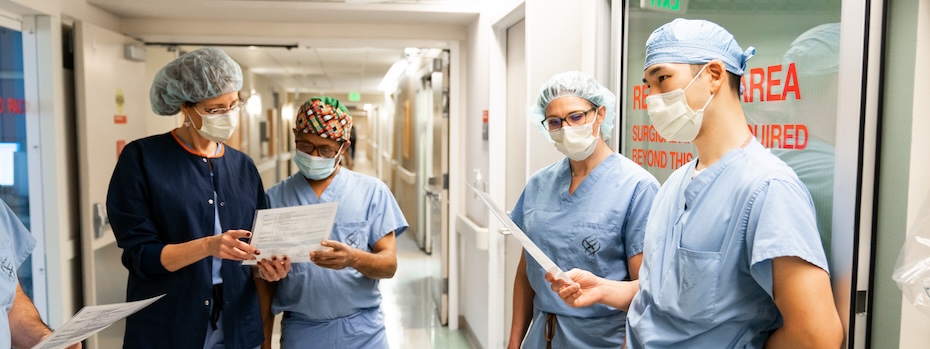Fetal Care Program Treatments and Services

Our Fetal Care Program provides advanced treatments and support services, starting with your first evaluation and during and after your pregnancy and delivery.
We are the only place:
- In the Pacific Northwest that offers fetoscopic repair for neural tube defects.
- In Oregon that provides care for Twin-Twin Transfusion Syndrome throughout pregnancy.
Evaluation
Imaging
Our fetal imaging team provides:
- Ultrasounds: These scans use sound waves to show your baby’s body parts. We’ll talk with you about what we see and what it means. In some cases, we may use high-resolution 3D and 4D ultrasound.
- Fetal echocardiogram: This scan helps us see the structure and movement of the developing heart. A fetal heart specialist will explain your results and options.
- Fetal MRI (magnetic resonance imaging): This scan shows detailed images of the developing brain, lungs and other organs. It can help us diagnose complex conditions.
Advanced diagnostic tests
We can look for genetic conditions or risk of genetic conditions with several tests:
- Amniocentesis: Uses a small amount of amniotic fluid removed from your uterus.
- Chorionic villus sampling (CVS): Uses a bit of your placenta.
- Percutaneous umbilical blood sampling (PUBS): Uses a small amount of blood from the umbilical cord.
Your doctor and a genetic counselor can help you choose the best tests and understand the results.
Treatments and procedures
Heart medications
We can give you medications to treat problems with your baby’s heart:
- A heartbeat that is not regular or is too fast or slow (fetal arrhythmia).
- Problems with electrical signals (impulses) in the baby’s heart because of parental lupus (a disease of the immune system).
- Structural heart defects.
Intrauterine transfusion
We can inject donated blood into the umbilical cord to treat a baby with severe anemia (too few red blood cells).
Shunts
We can place a small tube called a shunt to drain extra fluid and prevent organ problems. We may use a shunt for:
- Pleural effusion: When fluid builds up around the lungs.
- Lower urinary tract obstruction (LUTO): This happens when urine is blocked from leaving the bladder. That can force urine back into the kidneys (hydronephrosis) and lower levels of amniotic fluid. This damages the kidneys and prevents the lungs from developing.
Ex utero intrapartum treatment (EXIT) procedures
We offer EXIT procedures for breathing problems or other severe problems at birth.
We partly deliver and stabilize your baby before we disconnect the umbilical cord. We can do this through:
- EXIT-to-airway: We place a breathing tube or do surgery called a tracheotomy to clear the baby’s airway.
- EXIT-to-ECMO: We use a treatment called ECMO (extracorporeal membrane oxygenation). A device outside your body supports the baby’s heart and lungs.
Laser therapy for Twin-Twin Transfusion Syndrome (TTTS)
We offer the preferred treatment for TTTS, a placenta condition that happens in 10% to 15% of pregnancies with twins sharing a placenta (monochorionic twins). We are the only program in Oregon with care for TTTS from diagnosis through delivery.
Learn more about our care for Twin-Twin Transfusion Syndrome and other rare conditions in twin pregnancies.
Fetoscopic repair of neural tube defects (NTDs)
We offer surgery to reduce complications from neural tube defects, including spina bifida.
Fetoscopic repair uses tiny cuts the width of a pencil. The surgeon inserts a tube with a camera called a fetoscope to guide the repair. The baby stays in the uterus.
After surgery, you’ll return for follow-up care and tests until you give birth. At that point, we can help transfer care to our Spina Bifida Program or coordinate care near your home.
Open fetal surgery
We provide this treatment for a range of conditions. The surgeon makes the same large cut used for a C-section. The surgeon opens the uterus, partly delivers the fetus, makes the repair and puts the baby back.
Childbirth and care after birth
Many fetal conditions can be treated only after delivery. We help you plan a safe delivery and care for you and your baby after birth. Our program connects to the birth suites at OHSU Hospital and the newborn intensive care unit at OHSU Doernbecher Children’s Hospital.
We support a range of birth methods, including:
- Vaginal birth when possible. This includes “trial of labor after a Caesarean” (TOLAC) for patients who have had a C-section.
- C-section.
Learn more:
Ending a pregnancy for medical reasons
We know that deciding to end a pregnancy because of fetal anomalies or your health can be wrenching. We will discuss options with you with compassion and respect. We offer the level of support you prefer, during and after your care.
You’ll have access to:
- Genetic testing and counseling.
- A social worker who can help you find mental health and other services.
- Our Bridges Pediatric Palliative Care Program, which helps families with hard decisions.
- Care for pregnancy loss.
- Pregnancy termination.
We will talk with you about whether you wish to have your postpartum care (care after delivery) at OHSU or with your doctor.
Location
Kohler Pavilion, seventh floor
808 S.W. Campus Drive
Portland, OR 97239
Free parking for patients and visitors
Refer a patient
- Urgent referrals: 503-418-2843.
- Other referrals: Fax our referral form to 503-346-8215.
- Call 503-494-4567 or email fetalcare@ohsu.edu to seek provider-to-provider advice.